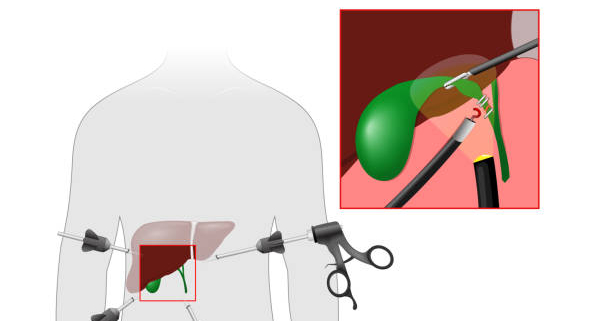The gallbladder, a small sac nestled beneath the liver, plays a crucial role in digestion by storing and releasing bile, a substance that aids in the breakdown of fats. However, gallstones, hardened deposits of cholesterol and other materials, can form within the gallbladder, causing pain and inflammation. Laparoscopic cholecystectomy, a minimally invasive surgical procedure, offers a safe and effective solution for treating gallbladder problems.
How Does Laparoscopic Cholecystectomy Work?
Traditional open surgery for gallbladder removal involves a larger incision in the abdomen. Laparoscopic cholecystectomy, on the other hand, utilizes a minimally invasive approach. Here’s how it works:
- Preparation: Before surgery, your doctor at Ayushman Hospital will assess your fitness through blood tests, imaging studies, and a physical examination. They will discuss your medical history and medications, advising any adjustments necessary. You may also be instructed to restrict food and drinks for a specific period before the procedure.
- The Procedure: Performed under general anesthesia, laparoscopic cholecystectomy involves several small incisions in the abdomen. A laparoscope, a slender instrument with a camera attached, is inserted through one incision, providing magnified views of the internal organs on a monitor. Specialized surgical tools are introduced through other incisions, allowing the surgeon to meticulously remove the gallbladder.
- Recovery: A significant advantage of laparoscopic surgery is the shorter hospital stay compared to open surgery. Most patients at Ayushman Hospital can return home the same day or the next day following the procedure. Recovery is generally quicker, with minimal pain and discomfort. You can typically resume normal activities within two weeks, though strenuous exercise might require temporary modification.
Benefits of Laparoscopic Cholecystectomy
Laparoscopic cholecystectomy is the preferred treatment for various gallbladder conditions, including:
- Cholelithiasis: Presence of gallstones in the gallbladder
- Cholecystitis: Inflammation of the gallbladder
- Biliary Dyskinesia: Abnormal gallbladder function leading to improper bile drainage
- Choledocholithiasis: Gallstones blocking the common bile duct
- Pancreatitis: Inflammation of the pancreas triggered by gallstones
Compared to open surgery, laparoscopic cholecystectomy offers several benefits:
- Smaller incisions: This translates to less scarring, reduced risk of infection, and faster healing.
- Shorter hospital stay: Quicker recovery allows you to return home and resume daily activities sooner.
- Minimal pain: Laparoscopic surgery generally results in less postoperative pain, leading to a more comfortable recovery experience.
- Improved cosmetic outcome: Smaller incisions leave minimal scarring, improving the cosmetic appearance of the abdomen.
Understanding Potential Risks and Side Effects
While laparoscopic cholecystectomy is a safe and well-tolerated procedure, it’s essential to be aware of potential risks and side effects, which can occur in 0.5% to 6% of cases. A thorough pre-operative evaluation by our experienced team at Ayushman Hospital helps minimize these risks. Some potential complications include:
- Anesthetic reactions: Allergic reactions to anesthesia or medications used during surgery can occur.
- Bleeding: Minor bleeding is possible during surgery, but excessive bleeding is a rare complication.
- Blood clots: Blood clots can develop in the legs after surgery, posing a health risk.
- Infection: As with any surgery, there’s a slight risk of infection at the incision sites.
- Injury to nearby organs: There’s a minimal risk of accidental damage to surrounding structures like blood vessels, bile ducts, or intestines.
- Pancreatitis: Inflammation of the pancreas can occur in a small percentage of patients.
- Bile reflux: Bile leakage into the stomach can cause discomfort.
- Post-cholecystectomy syndrome: This encompasses long-term side effects like diarrhea, constipation, and abdominal pain, experienced by some patients after gallbladder removal.
Laparoscopic Cholecystectomy at Ayushman Hospital
At Ayushman Hospital & Health Services, we understand the impact of gallbladder problems on your well-being. Our team of highly skilled gastrointestinal surgeons leverages advanced laparoscopic techniques and cutting-edge surgical equipment to ensure optimal patient outcomes. We offer personalized care, addressing your individual needs and concerns with the utmost expertise.
If you’re experiencing symptoms suggestive of gallbladder issues, consult our experienced gastrointestinal surgeons at Ayushman Hospital. They will guide you through a comprehensive evaluation to determine the best course of treatment, including laparoscopic cholecystectomy if necessary. With minimally invasive surgery and a commitment to patient care, we empower you to regain control of your health and live a fulfilling life.






